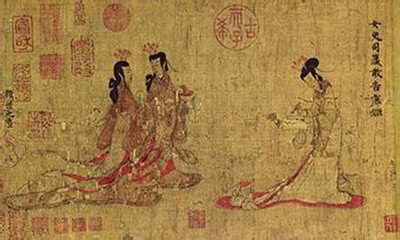The frame in front of me now shows a disturbing scene. A beautiful and seductive woman of the court harem is approaching the Emperor. The billowing robes and red ribbons that she's wearing accentuate her movement as she flutters coquettishly towards him. But as we look more closely, we can see that she's actually just faltering: she's just been brought up short by the Emperor's outstretched arm and hand, raised in an uncompromising gesture of rejection. Her body twists as she abruptly begins to turn away, and on her face is the expression of a shocked, thwarted vanity.
其中有一場景頗令人不安。一個美麗的宮廷女子正風情萬種地向皇帝走去,衣袂和紅絲帶隨著動作飛舞。但如果湊近細看你就會發現,皇帝伸出胳膊做出了拒絕的姿勢,表明自己不想親近美色,這令她躊躇不敢向前。女子身體扭轉,準備轉身離開,臉上是難以置信的挫敗神情。
At the time that the poem was written, China was in a state of fragmentation-following the collapse of the Han Empire-and competing forces jostled for supremacy, constantly threatening to dethrone the Emperor. The Emperor himself was mentally deficient, and so his wife, Empress Jia, had a great deal of power, which she spectacularly misused. The poem was written by her courtier, Zhang Hua, who was a minister at court and, according to a written history of the time, Zhang Hua was increasingly horrified by the way the Empress and her clan were usurping the authority of her husband; she was jeopardizing the stability of the dynasty and of the state by murder, intrigue and riotous sexual affairs. Zhang Hua wrote the poem ostensibly to educate all the women of the court, but his real target was of course the Empress herself. He hoped, through the inspiring and beautiful form of poetry, that he'd be able to lead his wayward ruler to a life of moral correctness, restraint and decorum:
公元二九二年,張華作詩之時,中國正處于漢朝崩塌后的分裂狀態,各方外力明爭暗斗,皇位危如累卵。當時的晉惠帝昏庸無能,賈皇后大權在握,行為荒唐。據史料記載,這首詩是她的朝臣張華所寫,據史料記載這位張華乃朝中大臣,張華憂心忡忡,擔心皇后及其同黨會篡奪皇位。她的淫亂、兇殘和奸詐嚴重威脅了王朝的安穩。張華的詩文表面上是在勸誡所有的后宮女子,實則是想進言賈后。他希望通過優美而發人深省的詩歌的力量,讓賈后回歸正道,安分守己,恪守婦道。












